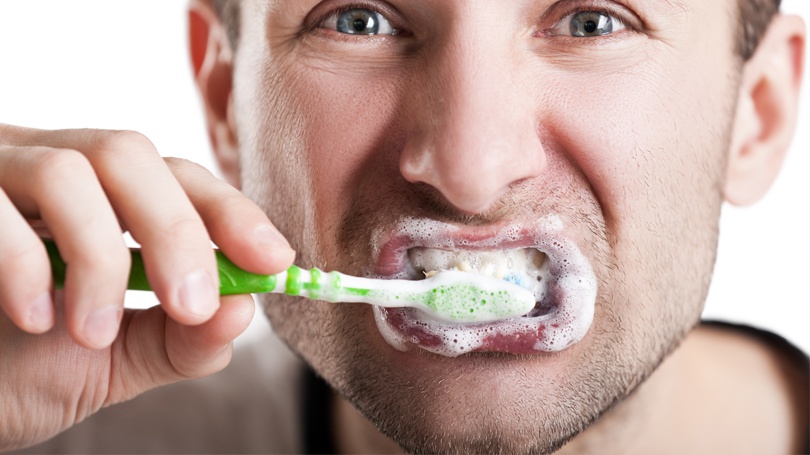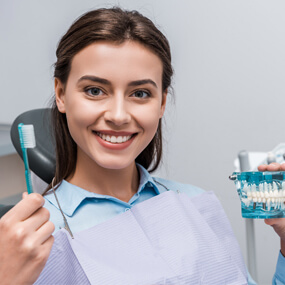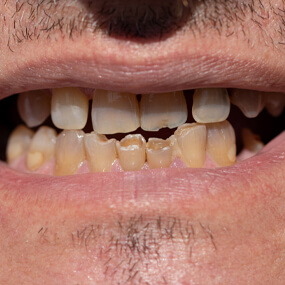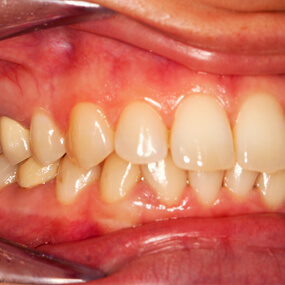Could You Be Brushing Your Teeth Too Much and Too Hard?

Consistent oral hygiene is a requisite of good oral health. Brushing, flossing, and visiting your dentist regularly will ensure that you enjoy healthy teeth and gums throughout your life. But did you know it is possible to be overeager when it comes to your oral care? Brushing after every meal and snack, scrubbing like you would a bathtub, and flossing too hard can all do more harm than good!
Toothbrush Abrasion
Toothbrush abrasion is the damage caused when your toothbrush bristles are too hard, you brush your teeth and gums too harshly, or you brush them too often. Such abrasion is characterized by worn tooth enamel but also receding gums and small divots near the gumline. You can cause abrasion with a heavy-handed touch but also a combination of improper technique, hard bristles, and coarse toothpaste.
You can also cause abrasion to your teeth through bad habits and lifestyle choices. Biting your nails is problematic, as is chewing on pencils, toothpicks, and so forth. You should never use your teeth as a tool, such as to tear open packages or pry open bottle caps. Oral piercings can irritate and even damage the teeth. Acidic foods can also lead to the wearing of your enamel and cementum, and you should never be quick to brush your teeth right after enjoying an acidic meal or snack. Wait a half hour at least.
Gum Recession
Overenthusiastic brushing, as well as poor brushing technique, can also cause receding gums. The loss of this soft tissue is problematic because it exposes the tooth root but also because it creates pockets where plaque can accumulate. Those pockets make it more difficult to keep the teeth and gums clean, and the buildup makes you more prone to gum disease. It is also important to note that gum recession cannot be reversed, and in serious cases, a gum grafting procedure may be required.
Sensitive Teeth
Both problems discussed so far can lead to another issue: teeth sensitivity. When enamel wears down—either through erosion or abrasion—it exposes the dentin, a lower layer it is intended to protect. This can make you sensitive to hot, cold, and sweet. This can happen when you eat or drink, but in some cases, brushing your teeth or the passage of cool air can trigger discomfort or even pain. You can also cause sensitivity by overusing teeth whitening treatments and toothpastes.
How to Brush Your Teeth Properly
Brushing your teeth well starts with having the right equipment. The American Dental Association recommends a soft-bristled toothbrush, and you can opt for either soft or extra soft. You may need to sample various products in order to find the toothbrush that is best for you in particular. The ADA also advises you to use a fluoride toothpaste that has the ADA Seal of Acceptance.
While it might be possible to choose bristles that are too soft, if the bristles are flattening against your teeth, that is a good indication you are brushing too hard. If you are being gentle and notice that the bristles are fraying in less than 12 weeks, then that indicates that the bristles are too hard. The ADA recommends that you change out your toothbrush about every three months regardless.
The ADA guideline for brushing is to do it once in the morning and again before you go to bed. There is no need to brush three or more times a day, and rinsing vigorously with water is enough after most snacks and meals. When you brush, you should do it for at least two minutes and no more than three. Hold your brush at a 45-degree angle and toward the gums so that the bristles slide beneath them a bit. Use light pressure. You can employ a circular or back-and-forth motion, but the key is to try and cover the entire surface with each complete stroke, which helps to avoid unnecessary wear.
It is important to brush the top, front, and back of each and every tooth. Before bed, you should also floss, and make sure to floss each tooth individually. You should also clean your tongue each time you brush, and you can do that with your toothbrush, or you can use a tongue scraper instead.
Protect Your Teeth and Gums
Regular brushing is essential to healthy teeth and gums, but there is never any need to scrub your teeth or brush them several or more times a day. You should also see your dentist twice a year for a cleaning and an exam. These regular checkups are an excellent opportunity to discuss your brushing and other oral hygiene habits with Jeffrey D. Clark, DDS. Schedule your next checkup at Scottsdale Cosmetic Dentistry Excellence by calling us at 480 585 1853.




